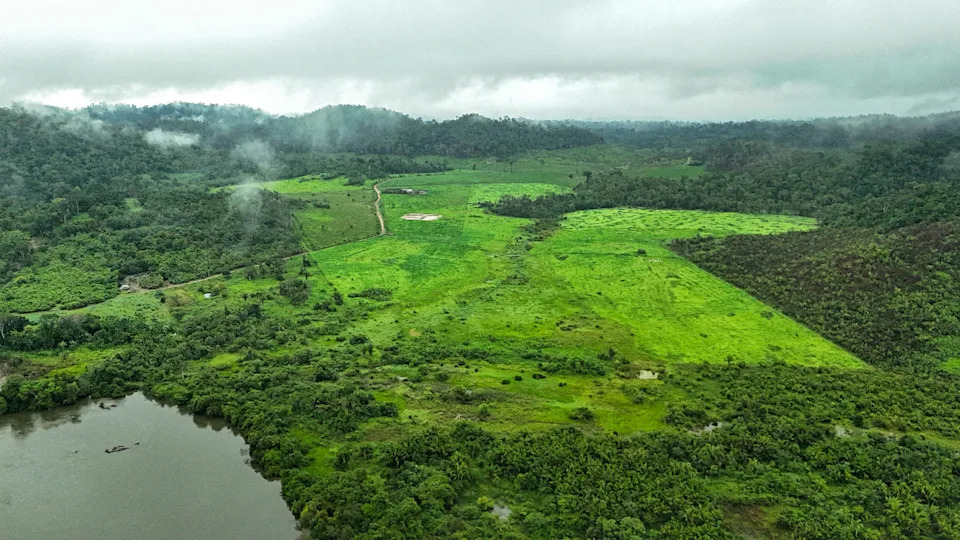'The Great Dying' mass extinction was a warning from the trees, study says
It happened before, and could happen again….
That's the message in a new study about the catastrophic collapse of Earth's tropical forests due to natural volcanic causes 252 million years ago.
The collapse of tropical forests was the primary cause of the prolonged global warming that followed, according to a new study published July 2 in the British journal Nature Communications. This coincided with a mass extinction, likely the worst in Earth's history.
“There is a warning here about the importance of Earth’s present-day tropical forests," study co-author and University of Leeds professor Benjamin Mills said, in a statement: "If rapid warming causes them to collapse in a similar manner, then we should not expect our climate to cool to preindustrial levels, even if we stop emitting CO2.
“Indeed, warming could continue to accelerate in this case even if we reach zero human emissions. We will have fundamentally changed the carbon cycle in a way that can take geological timescales to recover, which has happened in Earth’s past.”
 This aerial view shows a degraded area of the Amazon rainforest, near the Koatinemo indigenous land, in Para state, Brazil, on June 12, 2025.
This aerial view shows a degraded area of the Amazon rainforest, near the Koatinemo indigenous land, in Para state, Brazil, on June 12, 2025.'The Great Dying'
The huge climate changes back then occurred during the Permian–Triassic Mass Extinction – sometimes referred to as the "Great Dying," which happened around 252 million years ago, leading to the massive loss of marine species and significant declines in terrestrial plants and animals.
The event has been attributed to intense global warming triggered by a period of volcanic activity in Siberia, known as the Siberian Traps, the study says.
This rapid increase in carbon dioxide in Earth’s atmosphere and the resulting temperature increase is thought to be the primary kill mechanism for much of life at the time, according to the Conversation.
However, scientists had been unable to pinpoint why super-greenhouse conditions persisted for around five million years afterwards.
Now, in the new study, researchers have gathered data that supports the theory that the demise of tropical forests, and their slow recovery, limited carbon sequestration – a process where carbon dioxide is removed from the atmosphere and held in plants, soils or minerals.
What caused Earth's tropical forests to collapse 252 million years ago?
Our current understanding is that it was high temperatures which resulted from huge volcanic carbon dioxide emissions over thousands of years, Mills said in an e-mail to USA TODAY. "This volcanic event is called the Siberian Traps and may be the biggest to ever have occurred."
Did the lack of tropical forests cause the climate to change?
"Yes," Mills said, adding that the climate had already warmed, which initially caused the tropical forests to die back, but the removal of forests took away one of the planet's most important carbon removal processes – photosynthesis. The lack of this "carbon sink" caused CO2 levels to build up even further, which drove excess warming.
Is this happening now? Could it happen again?
"While the climate is currently warming (and is doing so faster than during the event 252 million years ago), we are not yet at the temperature where tropical forests are expected to reach a tipping point and transition into a carbon source rather than sink," Mills told USA TODAY.
"So it is not happening now, but we may not be that far away." We have warmed the planet by about 1 degree C since the Industrial Revolution, and estimates for Amazon rainforest tipping points range from 2 to 6 degrees C. It is hard to estimate this accurately.
How soon would the climate change after the tropical forests collapse?
The Triassic super-greenhouse took thousands of years to establish, but because we are emitting carbon dioxide much more quickly than in the deep past, we might expect effects to begin to occur "over hundreds of years," Mills said.
"To see 'super greenhouse' conditions we would need to remove almost all of the tropical forested area. It is debatable whether this could occur in the present day where the plants are different, and the shape of the continents is different than in the past. But personally I do not want us to run this experiment!"
Speaking about the new study, co-author Jianxin Yu of the China University of Geosciences added: “Let’s make sure our work transcends academia: it is a responsibility to all life on Earth, today and beyond."
"Earth’s story is still being written, and we all have a role in shaping its next chapter," Yu said.
This article originally appeared on USA TODAY: Forest loss fueled 'Great Dying' mass extinction, study says













